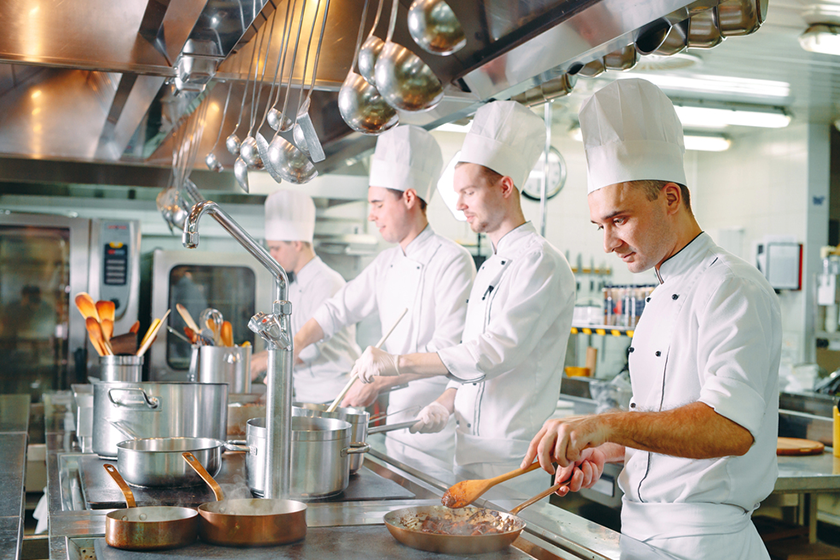10 Fire Code Violations You Must Avoid In Your Restaurants

Fire safety is a critical concern for any restaurant owner. Not only does it ensure compliance with local regulations, but it also protects the lives of your employees and customers. Fire hazards are ever-present in commercial kitchens, where open flames, high temperatures, and flammable materials are part of daily operations.
Therefore, understanding and avoiding common fire code violations is essential for maintaining a safe environment.
Blocked Exits and Fire Doors
A clear and unobstructed path to safety is non-negotiable in any emergency. Exits and fire doors are the primary means of escape during a fire, and blocking them can have catastrophic consequences. Fire codes mandate that all emergency exits, hallways, pathways, and stairways must be kept clear at all times. This is not just a guideline but a legal requirement aimed at ensuring quick and safe evacuation.
Blocking an exit with furniture, boxes, or any other obstacles can lead to life-threatening situations in the event of a fire. It’s crucial to conduct regular checks to ensure that all exits and pathways remain free from obstructions. Employees should be trained to recognize the importance of keeping these areas clear and to take immediate action if they notice any blockages.
Improper Storage of Flammable Materials
In a restaurant, the improper storage of flammable materials is a significant fire risk. Kitchens often contain various hazardous substances, including cleaning chemicals, cooking oils, and other flammable items that, if not stored correctly, can ignite and cause a fire. Proper storage guidelines require that these materials be kept away from heat sources and stored in designated, fire-resistant cabinets.
The impact of improper storage can be devastating, especially in an environment where high temperatures are a constant factor. A small spark can ignite flammable materials, leading to an uncontrollable fire. To mitigate this risk, ensure that all hazardous materials are stored according to fire safety standards, and regularly review storage procedures with your staff.
Unmaintained Fire Alarms and Protection Systems
Regular maintenance of fire alarm systems is not just a recommendation; it’s a necessity. Fire alarms are your first line of defense in alerting occupants to danger, giving them time to evacuate. However, these systems are only effective if they are in proper working order. Regular inspections and testing of fire alarms and protection systems are required by law to ensure they function correctly when needed.
Neglecting maintenance can lead to a fire alarm system failure during an emergency, rendering it useless at the most critical moment. This puts lives at risk and can result in severe legal and financial repercussions for your business. Investing in professional fire alarm services to regularly inspect and maintain your systems is a wise decision that can prevent disasters.
Accumulation of Combustible Materials
Combustible materials, such as paper products, cloth, and other flammable items, should never be allowed to accumulate in or around your restaurant. Fire codes prohibit the storage of these materials in a manner that could contribute to the rapid spread of fire. This is particularly important in areas near heat sources or electrical equipment, where a small spark could lead to a significant fire.
For example, storing cleaning supplies or boxes in electrical rooms can create a dangerous fire hazard. Regularly clearing out clutter and ensuring that combustible materials are stored properly is essential for minimizing fire risks. This helps you comply with fire codes and makes your restaurant a safer place for everyone.
Issues with Hood Systems
Kitchen hood systems play a critical role in preventing grease fires, which are a common cause of restaurant fires. These systems are designed to filter out grease and smoke, reducing the risk of a fire starting and spreading in the kitchen. However, if hood systems are not properly maintained, they can become a fire hazard themselves.
Statistics show that improperly cleaned hoods account for many restaurant kitchen fires. Grease buildup in the hood system can ignite, leading to a fire that quickly spreads throughout the kitchen.
To prevent this, it’s essential to schedule regular cleaning and maintenance of your hood systems by certified professionals. This will ensure that your hood system remains effective and compliant with fire safety regulations.
Faulty Fire Extinguishers
Fire extinguishers are vital tools in managing small fires before they become uncontrollable. However, they are only effective if they are accessible and in working order. Fire codes require that extinguishers be regularly inspected and maintained to ensure they are functional when needed.
A faulty fire extinguisher can lead to an inadequate response to a fire, allowing it to spread and cause more damage. To avoid this, ensure that your fire extinguishers are regularly inspected by qualified professionals and that all employees are trained in their proper use. This proactive approach can make all the difference in the event of a fire.
Improper Use of Extension Cords
Extension cords are commonly used in restaurants to power various appliances and equipment. However, they are intended for temporary use only. The improper use of extension cords, such as using them as a permanent solution or daisy-chaining multiple cords together, can significantly increase the risk of an electrical fire.
Fire codes strictly prohibit the misuse of extension cords because they can overheat and ignite, especially when used improperly. It’s essential to ensure that all electrical equipment is plugged directly into a wall outlet or connected using appropriate, permanent wiring solutions. Regularly check the condition of extension cords and replace any that show signs of wear or damage.
Inadequate Exit Signage and Lighting
Proper exit signage and lighting are critical components of a safe evacuation plan. Fire codes require that all exits be clearly marked and illuminated to guide occupants to safety in an emergency. Inadequate or non-functional exit signage can lead to confusion and panic during a fire, making it difficult for people to find their way out of the building.
Regular checks of your exit signs and emergency lighting systems are necessary to ensure they are functioning correctly. Replace any burnt-out bulbs and address any issues with signage visibility immediately. This simple yet crucial step can save lives by ensuring that everyone can quickly and safely evacuate the premises in the event of a fire.
Overfilled Grease Traps
Grease traps are designed to capture grease and prevent it from entering the sewage system, but they can also become a significant fire hazard if not properly maintained. An overfilled grease trap can create flammable conditions, particularly in a kitchen environment where high heat is common.
Fire codes require regular cleaning and maintenance of grease traps to prevent them from becoming a fire risk. This involves scheduling regular inspections and cleanings by qualified professionals. By keeping your grease traps in good working order, you reduce the risk of a fire starting in your kitchen and ensure compliance with fire safety regulations.
Non-compliance with Fire Sprinkler Systems
Fire sprinkler systems are one of the most effective means of controlling and extinguishing fires in commercial buildings. However, to be effective, these systems must be installed and maintained according to the standards set by the National Fire Protection Association (NFPA). Non-compliance with these standards can lead to inadequate fire suppression during an emergency, putting lives and property at risk.
Regular testing and maintenance of your sprinkler system are essential to ensure it functions correctly when needed. This includes inspecting the system for any signs of wear or damage and promptly addressing any issues. Complying with fire sprinkler regulations not only protects your restaurant but also demonstrates your commitment to safety.
Fire safety in restaurants is not something to take lightly. By understanding and avoiding these common fire code violations, you can create a safer environment for your employees and customers while ensuring compliance with local regulations. Regular inspections, maintenance, and staff training are the cornerstones of a robust fire safety plan.
At Fire Safety Alarms, we take pride in offering comprehensive fire alarm services tailored to meet the specific needs of restaurants. Our expert team is dedicated to helping you maintain a safe and compliant environment.
Contact us today to learn more about how we can support your fire safety needs and ensure that your restaurant is fully protected.
